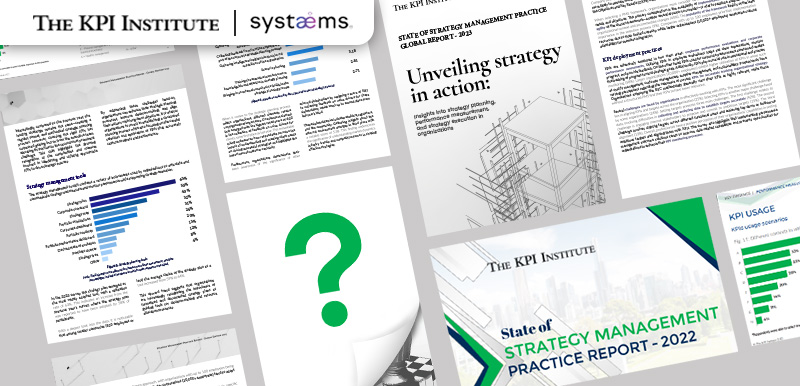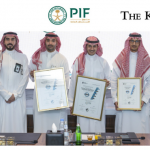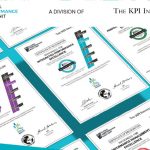Inside the State of Strategy Management Practices Report: What’s New and How It Can Optimize Your Strategy

In today’s fast-paced business environment, mastering strategy management is more critical than ever. It allows you to define your competitive edge, implement proper resource allocation, risk management, and performance measurement, and most importantly, drive innovation while building resilience for long-term success.
Committed to empowering organizations in that pursuit, The KPI Institute launched the State of Strategy Management Practice Report in 2022. The State of Strategy Management Practices Report is a detailed examination of current trends, challenges, and innovations within the realm of strategy management. This report synthesizes data from a wide range of sources, including surveys of industry leaders, interviews with experts, and an analysis of real-world case studies.
The report consists of three main sections: Strategy Planning, Strategy Measurement, and Strategy Execution. Each of these sections includes several areas of interest such as general practices, strategy review, key performance indicators (KPI) deployment practices, strategy execution challenges, and project management practices. It also offers recommendations for best practices to enhance strategy management and equip organizations to better navigate emerging trends and disruptions.
The State of Strategy Management Practice Report is an annual publication, and the continuity allows organizations to stay adaptable in a changing business environment. With this ongoing commitment, organizations are able to grasp the broader perspective and identify patterns and shifts, allowing them to adjust strategies and make continuous improvements.
In the State of Strategy Management Practice – 2023 Middle East Report, results in the Strategy Planning section show that most surveyed professionals see strategy formulation as consistent and structured, with 47% using specialized methodologies. In contrast, 38% reported no specific methodology, indicating a more flexible approach. It is also important to note that 15% acknowledged an informal process. Although an informal process may offer flexibility, it’s important to consider the potential drawbacks and challenges that arise from having a strategy without a strict framework.
Furthermore, in the Strategy Measurement section, 22% of respondents reported that their organizations lack a formal performance management system (PMS). The absence of a PMS creates several challenges, obstructing strategy execution and limiting the organization’s ability to adapt to change and capitalize on opportunities. This is further reflected in the Strategy Execution section, where professionals were asked about their organizations’ success in executing strategy; 57% acknowledged being aware of cases where the strategy had failed.
Given these red flags, it is crucial to recognize that strategy management practices must evolve to meet organizational needs and adapt to the external environment. To determine whether the figures above have improved and if organizations have enhanced their strategy management, The KPI Institute conducted another research this year, diving more into the Middle East and North Africa (MENA) region. The findings will be presented in the third edition of the State of Strategy Management Practices Report.
The State of Strategy Management Practices Report – 2024 MENA Region will be available soon. This report presents statistics from over 100 organizations and features insights from leaders of top companies. This edition has been more refined as it offers advice from The KPI Institute’s own experts on developing more effective organizational systems for strategy planning and execution.
Stay tuned for the official release date and details on obtaining your copy. For updates and exclusive content, sign up for our newsletter and follow us on LinkedIn.

Tags: MENA Region, Middle East, North Africa, State of Strategy Management Practice Report, Strategy and Performance Management, Strategy Execution, Strategy Measurement, Strategy planning





